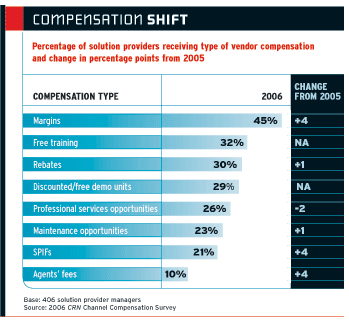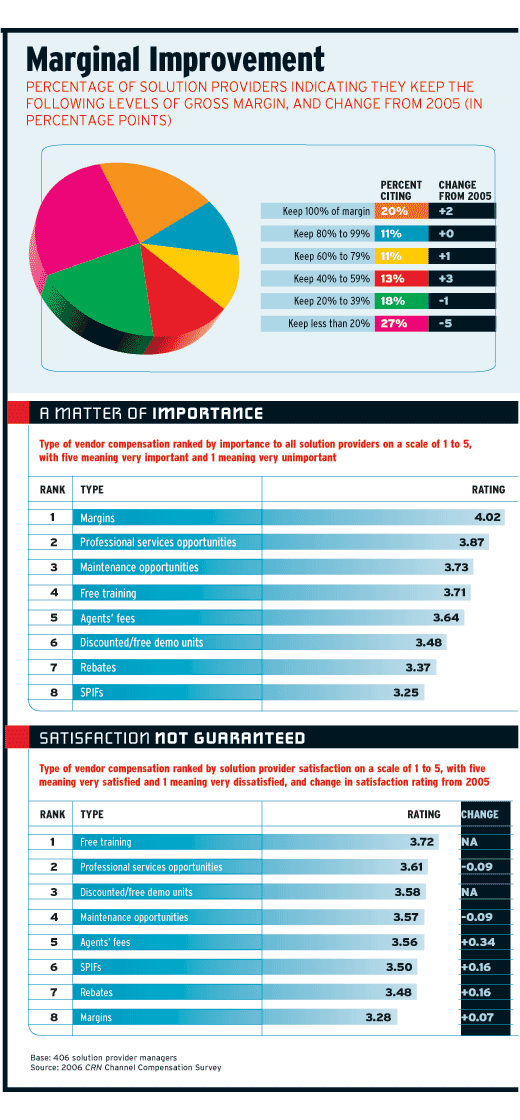Margins Improve, But They're No Longer The Main Course
Certainly, product margins remain the most common—and most valued—form of compensation that a high-tech vendor can provide its channel partners. But more and more, they're just the dialogue opener.
As was the case last year, solution providers in the 2006 CRN Channel Compensation Survey rated product margins as still the most important, but also least satisfactory, form of vendor compensation, an indication that they are looking elsewhere for profits these days.
The survey did show vendors were making some improvements in this area. For example, the number of respondents who said they were able to hold on to 100 percent of those margin dollars rose to 20 percent from 18 percent.
But other benefits that don't so much compensate a solution provider outright but rather that enhance their business strategies—such as professional services opportunities, maintenance opportunities, sales and marketing support, managed services options and free training—are what really get solution provider owners and managers talking and selling.
Pat Grillo, president and CEO of Atrion Communications Resources, a security VAR in Branchburg, N.J., said the margin question is just the first in a series of check offs when it comes to choosing new vendors or sticking by ones with which he already is allied. His company expects to earn 18 points to 20 points on products, to start. But he added: "We can do with a little less if it's a product that wraps around better with our services."
Other factors Grillo considers include how easily and expensively his sales team can get their hands on demonstration equipment, what sorts of funds the vendor advocates and distributes for marketing activities and his company's potential revenue stream in the second year of the relationship, which needs to be at least $1 million.
Grillo also is focused on the vendor's education and certification policy. Obviously, he'd love for these activities to cost him nothing, he said. "We're putting more of an onus on [vendors for] the technical training."
Likewise, Marty Andrefski, vice president of sales and operations at IntegraOne in Allentown, Pa., said one of the things his systems integration firm is monitoring more closely these days is the cost of training he devotes to certain relationships. "We're getting to the point where we're telling vendors they have to help pay. They're starting to bend a little bit," he said.

Chuck Orrico, president and co-owner of Dyonyx, a Houston-based integrator that splits its revenue 50-50 between government and commercial accounts, said he applies a different compensation matrix to his vendors depending on the particular market he's discussing, although access to training is one of the most critical factors.
Vendors seem to be listening. The 2006 CRN Channel Compensation Survey, which asked 408 solution provider managers to rate the importance of and their satisfaction with eight types of vendor compensation, found that solution providers were most satisfied with free training provided by vendors. In terms of importance, free training ranked fourth, after margins, professional services opportunities and maintenance opportunities.
If there was another bright spot in the survey, it was in professional services, which solution providers rated second both in importance and in satisfaction. Maintenance opportunities also delivered above-average importance and satisfaction ratings. The message seemed to be that solution providers are focusing more on the recurring revenue that their value-added services deliver than margins and rebates. "You draw what you want out of a vendor," said Jennifer Wright, vice president of Wright Business Technologies, a communications VAR and managed services provider in Houston.
For Wright, whether or not a product carries the promise of recurring revenue is the most important consideration. "Can it be managed, and is it compatible with the providers and products that I use?" she said. "This is a strategic avenue for our business, first and foremost."
| /**/ /**/ |
Bob Murphy, co-president of Networked Information Systems, an infrastructure integrator in Woburn, Mass., said while he considers good margins to be in the 15 percent to 20 percent range for an
product, he's willing to consider taking less on the front if he sees a viable long-term services opportunity. "If I've got someone in the 5 percent or 10 percent range, yet all the professional services are delivered by their key partners, that's worth a ton to me," he said. "I can write a solid business proposition around that."
Several solution providers said support for demand-generating activity also was critical. In order to become a strategic vendor for GreenPages, as opposed to one that it carries for tactical reasons, the vendor has to be greenlighted by the solution provider's engineering, sales and marketing teams, said Glen Jodoin, vice president of operations at GreenPages, Kittery, Maine. Jodoin said the marketing department, however, is the one with veto power: If GreenPages can't foresee legitimate joint demand-generation opportunities wrapped around a particular product, then the company won't make a deep investment no matter how tempting the margin.
This is especially true of bleeding-edge products. "The No. 1 thing is, can we make money selling your product?" he said.
Rob Wolfe, president and CEO of AvcomEast, an enterprise solution provider in Silver Spring, Md., also puts a lot of stock on vendors' use of marketing funds and considers it a vital form of compensation that they can provide partners that are demand generators. But his hottest button these days is deal registration because it protects the upfront consulting his company pours into larger, more complex solutions. In essence, it's the vendor's way of backing up their margin proposition with a money-back guarantee. "Deal registration is very important to the compensation metrics we apply to our vendors," Wolfe said.
Solution providers that participate in back-end rebates and associated deal registration programs, say they find them an important way to enhance margins and profitability. Murphy said Networked Information Services, which works closely with four major product suppliers, is seeing more of its margin from particular vendor partners accrue on the back end over a quarterly or annual basis, based both on his company's ability to meet sales goals and as a reward for the extra effort it puts into becoming an expert in and evangelizing the vendors' technologies.
"Good margins nowadays are getting delivered in a lot of different ways," Murphy said. "It's not front-loaded discounting."
IntegraOne's Andrefski said unlike many back-end rebates, deal registration policies usually ensure that a solution provider can hold on to more of the value associated with developing demand for a technology in a particular account. "Deal registration does hold it for those who hunt, groom and close. There generally is some margin that holds to the bottom line," he said.
As solution providers move into managed services, though, they say they are increasingly looking for vendors that support them in ways that go beyond margins and rebates. Orrico said because Dyonyx leads with its management consulting message and has access to C-level executives, his team often can negotiate special considerations, not necessarily in the form of margin. "When you have that attention, the vendor partners are very eager to do whatever you need to get in front of [those customers]," Orrico said.
Wright agreed that vendors can compensate channel partners in several other ways, "none of which involve cash."
Her advice to vendors is simple: Put personnel in the field that don't just understand the product and related quotas, but that also have knowledge of how programs work across the company in other product lines. If you have a joint-selling opportunity, send someone qualified to discuss the technology who won't spend time in the meeting answering e-mail as one vendor rep once did with her. And they should focus on understanding how their products fit into each solution provider's own unique value proposition. "I don't care about what your quota is, I care about my business," she said.
These factors will override any short-term problems a vendor might have when it comes to sagging margins or brief program missteps. "If we have bumps in the road and you've been loyal to us, we'll stick with you," Wright said.
The bottom line: Solution providers still care about margins and other forms of cash compensation on products they sell, but they also care deeply about how a vendors' programs and products align with their company's strategic goals and ability to generate demand for their solutions and services.
